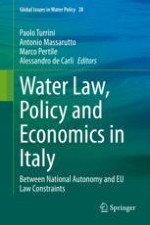2021 | OriginalPaper | Buchkapitel
4. Testing the Waters: A Sociological Analysis of Domestic Water Use and Consumption
verfasst von : Filippo Oncini, Francesca Forno
Erschienen in: Water Law, Policy and Economics in Italy
Aktivieren Sie unsere intelligente Suche, um passende Fachinhalte oder Patente zu finden.
Wählen Sie Textabschnitte aus um mit Künstlicher Intelligenz passenden Patente zu finden. powered by
Markieren Sie Textabschnitte, um KI-gestützt weitere passende Inhalte zu finden. powered by
